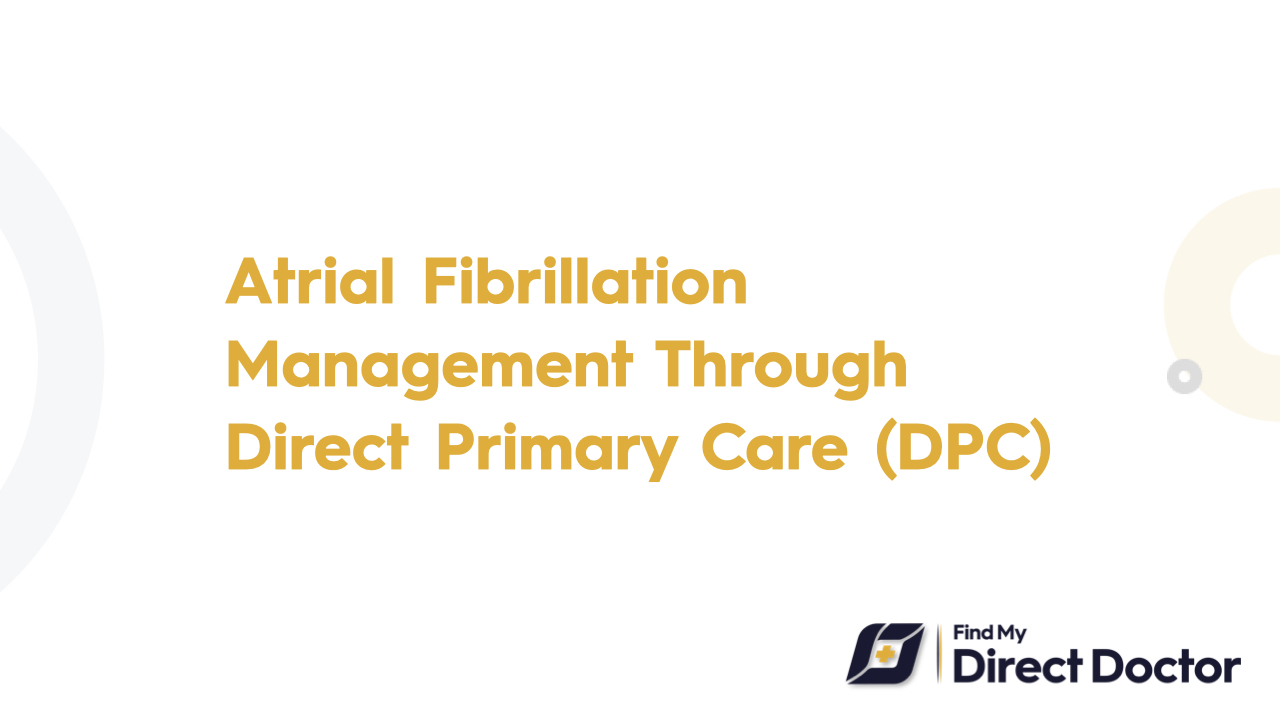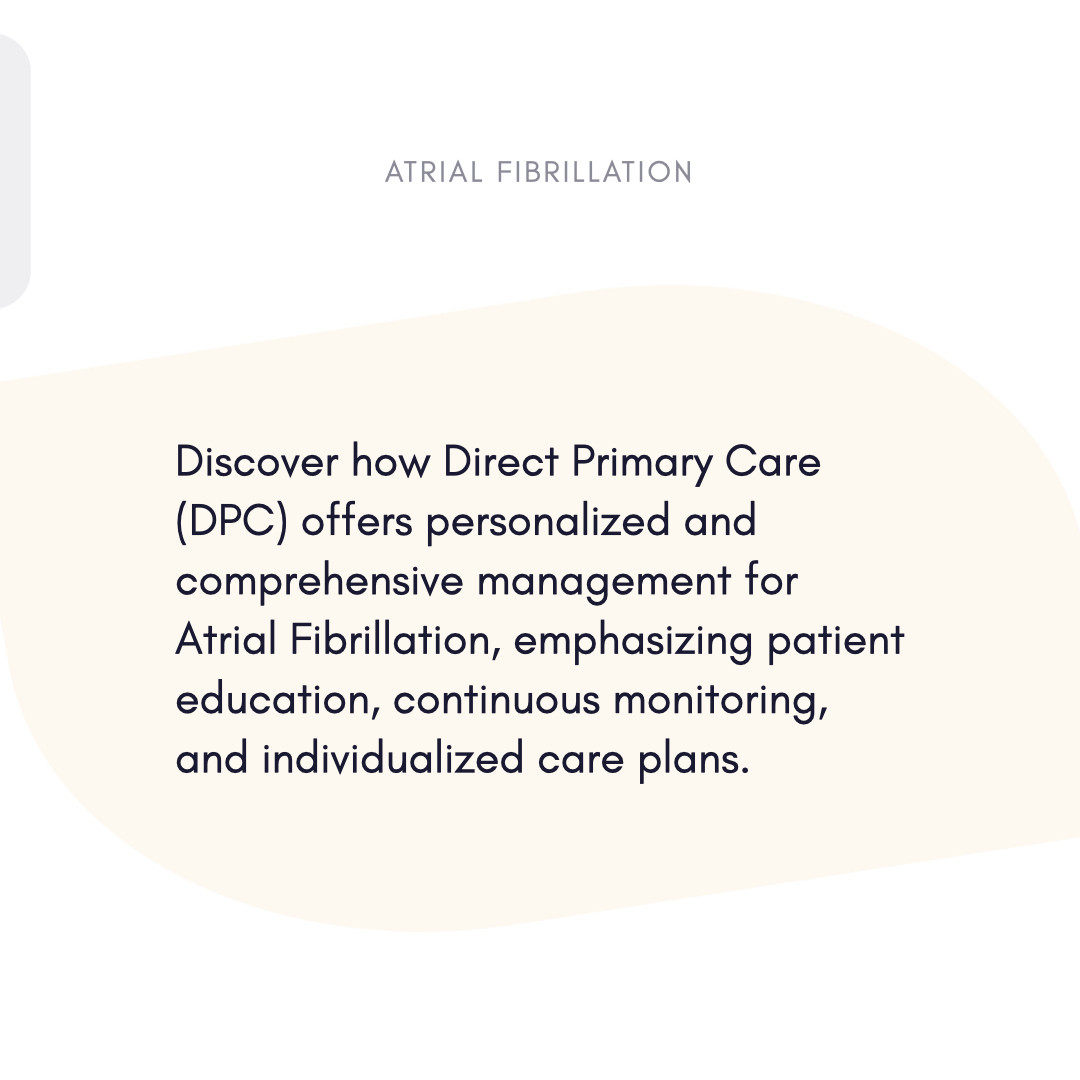Atrial Fibrillation and Direct Primary Care (DPC): Personalized, Proactive Heart Care
An irregular and typically fast heart rate, atrial fibrillation (AFib) raises the risk of stroke, heart failure, and other complications. Managing AFib calls for constant monitoring and a mix of drugs and lifestyle modifications. Combining accessibility, cost, and tailored strategies to stabilize heart rhythm and lower risk, Direct Primary Care (DPC) provides a patient-centered approach to AFib treatment.

Managing Atrial Fibrillation: Important Difficulties
Causes:
- Obesity
- Alcohol use
- Hypertension
- Heart disease
- Hyperthyroidism
Symptoms:
- Palpitations
- Fatigue
- Vertigo
- Dyspnea
- Chest discomfort
Complications:
- Chronic fatigue
- Heart failure
- Stroke
Diagnosis:
- Echocardiograms
- ECG
- Holter monitors
- Blood tests (e.g., thyroid function)
How DPC Improves AFib Control
Offering unrestricted access to a primary care physician, Direct Primary Care (DPC) is a membership model (USD 50–200/month). For those with AFib, this entails:
- No waiting for urgent evaluations of palpitations or dizziness
- Open pricing: Discounted drugs, cardiac monitoring, and expert referrals
- Holistic treatment addressing stroke prevention, comorbidities, and heart health
Key Strategies:
-
Quick Diagnosis and Surveillance:
- In-office ECGs: Immediate heart rhythm assessments (USD 20–50 vs. USD 150+ historically)
- Holter monitors (24–48 hours) at cash-pay rates (USD 100–200)
- Lab work: Test renal, electrolyte, and thyroid functions to identify AFib triggers
-
Customized Therapy Schedules:
- Rate control: Beta-blockers (e.g., metoprolol) or calcium channel blockers (e.g., diltiazem) at wholesale rates (USD 5–15/month)
- Rhythm control: Antiarrhythmics (e.g., amiodarone) or cardioversion coordination
- Anticoagulants (e.g., apixaban, warfarin) with regular INR checks for stroke prevention
-
Ongoing Assistance and Prevention:
- Frequent follow-ups to track symptoms, medication side effects, and INR levels
- Lifestyle coaching: Weight management, alcohol moderation, and stress reduction
- Cardiology coordination: Quick referrals for pacemaker or ablation evaluations
DPC Benefits for AFib Patients
Improved Accessibility:
- Same-day appointments for syncope or sudden palpitations
- 24/7 telehealth for medication changes or side effect discussions
Comprehensive Care:
- Continuous monitoring of comorbidities (e.g., diabetes, hypertension) to reduce AFib burden
- Long-term relationships to improve adherence to anticoagulation and lifestyle plans
Individualized Attention:
- Tailored strategies for paroxysmal vs. persistent AFib and CHA₂DS₂-VASc scores
- Stroke prevention coordination with neurologists and electrophysiologists
DPC's Customized AFib Management
The ACC stresses a total AFib treatment approach. DPC delivers this via:
Risk Factor Management:
- Weight loss programs targeting obesity (a key AFib trigger)
- Sleep apnea screening: Partner with sleep experts for CPAP evaluations
- Alcohol moderation counseling to reduce arrhythmia risks
Behavioral Guidance:
- Motivational interviewing to promote exercise and smoking cessation
- Mindfulness or yoga referrals to lower cortisol levels
Specialist Coordination:
- Collaborate with cardiologists for ablation or left atrial appendage closure
- Regular CHA₂DS₂-VASc reassessments and anticoagulant adjustments for stroke prevention
Real-Life Success Stories
Case 1: Linda, 68, avoided stroke despite a CHA₂DS₂-VASc score of 4 through DPC-managed apixaban and monthly INR checks.
Case 2: Mark, 55, reduced AFib episodes by 60% with DPC’s metoprolol adjustments and weight loss program.
FAQs: DPC and Atrial Fibrillation
Q: Can DPC manage warfarin and other blood thinners?
A: Yes! DPC doctors track INR levels and adjust dosages to maintain therapeutic ranges.
Q: Are Holter monitors covered?
A: DPC negotiates cash-pay rates (USD 100–200) for 24–48-hour monitoring.
Q: How does DPC handle fast AFib crises?
A: Immediate ER referrals followed by post-discharge care coordination.
Why DPC Changes AFib Outcomes?
- Reduces stroke risk: Timely anticoagulation and INR monitoring
- Simplifies care: One provider manages tests, medications, and specialists
- Empowers patients: Teaches lifestyle changes and symptom tracking
How DPC Aligns with ACC Guidelines
DPC’s approach supports ACC recommendations by:
- Prioritizing prevention: Addressing modifiable risks like hypertension and obesity
- Ensuring consistency: Frequent visits improve adherence to anticoagulants and lifestyle plans
- Integrating care: Seamless specialist coordination ensures total management
Take Control of Your Heart Rhythm with DPC
Atrial fibrillation doesn’t have to limit your life. With a partner committed to affordable, proactive, and tailored treatment, DPC helps stabilize your heart rhythm and reduce risks.






